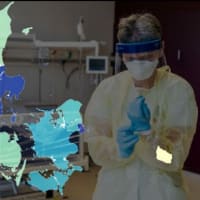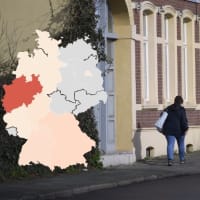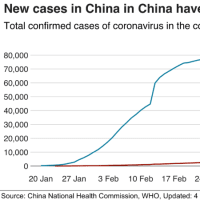2016年5月20日(Fri.) これは何? と思わせる見出しの記事がありました。 デンマークでの話ですが、多少の補足が必要のようです。(ニュースソース: THE LOCAL DK 5月20日発 )
<原文の一部>
Christiania project serves up Japanese food with a twist
Published: 20 May 2016 12:29 GMT+02:00

During the month of June, head to Christiania for Japanese food made with expired, yet edible ingredients.
Expired foods have never tasted this good. That’s the idea behind a new project in Christiania started by Maiko Shintani, a Japanese expat living in Copenhagen. “Cooking Japanese dishes by food wastes” – as the event is called, will go on during the entire month of June.
As its name implies, the meals will be cooked with expired yet still edible foods found at the WeFood, the first supermarket in Denmark to sell nothing but surplus food.
“It’s always both interesting and challenging to think about what you could do, should do and want to do in your life. My project was somehow born through this process”, Shintani told The Local.
Shintani will offer different dates throughout June in which she will prepare meals that will range in price from completely free to just 50 kroner. As part of the event, attendees will be able to try their hand at making sushi, playing with origami and conversing in Japanese.
Shintani said that Christiania, the largely self-governed enclave in the heart of Copenhagen, was the ideal location to begin her project, considering the former hippie commune's long-running support for artistic exploration and expression through the Christiania Researcher in Residence (CRIR) programme.
According to the CRIR website the aim of the programme is “to involve artists, researchers and academics in an open, critical and reflective dialogue around the free town in Christiania in Copenhagen, and to feed new creative and critical thinking into the public realm.”
Shintani joins a list of researchers from Norway, England, Belgium, Lithuania, Sweden, Austria, France, and the United States who have conducted research in Christiania.

Maiko Shintani, a Japanese expat living in Denmark is organizing the project. Photo: Maiko Shintani
Christiania’s approach to sustainability was another reason Shintani chose that specific location to host her project.
“I got to know that Christiania has a long history for recycling and reusing materials to stop waste. In Japan, we have a word, which conveys a sense of regret concerning waste. 'Mottainai' means roughly 'what a waste!' in English. It seems we have common philosophy between Christiania and Japan,” she told The Local.
Although Shintani is unsure of what the impact of the project will be, she hopes to educate visitors about the diversity found in Japanese cuisine – which many assume is limited to sushi but actually goes far beyond that. She also hopes her project will get the ball rolling for the next year's 150th anniversary of Denmark and Japan commencing diplomatic relations.
(抜粋)コペンハーゲンにあるクリスチャニアと言う地区において、来月(6月)の1ヶ月間続けられるイベントです。期限切れの食品を使って日本料理などを提供するプロジェクトで、コペンハーゲンに住む日本人の Maiko Shintani さんが主導するようです。
(注: 先ずは、デンマークでは期限切れ等による廃棄食品の削減に取り組んでいる最中であることが一つ。次に、クリスチャニア地区というのは、コペンハーゲン内のある地区を示していますが、かつてヒッピーたちの溜まり場になっていたそうで、いわば、治外法権のようなエリアになってしまった・・・と言う場所です。この地区ではドラッグを使う人もいて、取締りするよりも、欲しい人には与えると言う政策もとられたと聞きました。そうした意味で、特別な地域と言えるでしょう。私がデンマークに滞在したのは2012年のことですが、その時には、不用意に同地区には近づくなと言われました。写真・カメラも厳禁・・・です。もっとも、知人のアメリカ人の一人は、「クリスチャニアを見てくる・・・」と言って、一人で訪問してきました。)
デンマークで最初にできたスーパーマーケット「 WeFood 」で開催され、私達は廃棄食品削減について、一体何ができるのか・・・と言う命題でもって、このイベントに臨むそうです。
また、この期間中には、寿司を作ったり、折り紙を折ったり、日本語会話を楽しんだり・・・と言うことも出来るそうです。
また、Maiko がクリスチャニアを選んだ理由として、そこには、リサイクルやリユースの面で長い歴史があることや、日本での考え方「もったいない」(英語では: 'what a waste!' )と言う哲学に、共通性のようなものがあることを感じたためだそうです。
そして、来年(2017年)は、デンマークと日本の外交関係樹立150年の節目になるので、それに弾みをつける目的もある・・・としています。
***
こうした場所(コペンハーゲン)でも活躍している日本人がいることに頼もしさも感じますし、海外から日本を眺めてみると、結構見えてくるものが少なくないでしょう。旅行レベルではない海外滞在は、お薦めですが、今は熟考が必要ですね(私見)。 一方、食品廃棄物の量的問題は、日本でも問題視されつつある課題の一つでしょう。大量生産や利益至上主義で、狭い市場に類似商品を投入する結果、価格のみの競争に陥り、互に消耗・疲弊して行くことになり、食品関連業界について言えば、大量の食品ロスをも生んでしまう・・・と言うことでしょう。
人まねではなく、独自性をそれぞれが発揮した形での事業構築を目指すべきでしょう。 そして、消費者側がもっと目覚めなければならないのでしょう。安ければ良いとは必ずしも言えないのです・・・。
*** 下の写真は、記事内容とは関係ありません。 ( Dana Kareglazaya )


***
<原文の一部>
Christiania project serves up Japanese food with a twist
Published: 20 May 2016 12:29 GMT+02:00

During the month of June, head to Christiania for Japanese food made with expired, yet edible ingredients.
Expired foods have never tasted this good. That’s the idea behind a new project in Christiania started by Maiko Shintani, a Japanese expat living in Copenhagen. “Cooking Japanese dishes by food wastes” – as the event is called, will go on during the entire month of June.
As its name implies, the meals will be cooked with expired yet still edible foods found at the WeFood, the first supermarket in Denmark to sell nothing but surplus food.
“It’s always both interesting and challenging to think about what you could do, should do and want to do in your life. My project was somehow born through this process”, Shintani told The Local.
Shintani will offer different dates throughout June in which she will prepare meals that will range in price from completely free to just 50 kroner. As part of the event, attendees will be able to try their hand at making sushi, playing with origami and conversing in Japanese.
Shintani said that Christiania, the largely self-governed enclave in the heart of Copenhagen, was the ideal location to begin her project, considering the former hippie commune's long-running support for artistic exploration and expression through the Christiania Researcher in Residence (CRIR) programme.
According to the CRIR website the aim of the programme is “to involve artists, researchers and academics in an open, critical and reflective dialogue around the free town in Christiania in Copenhagen, and to feed new creative and critical thinking into the public realm.”
Shintani joins a list of researchers from Norway, England, Belgium, Lithuania, Sweden, Austria, France, and the United States who have conducted research in Christiania.

Maiko Shintani, a Japanese expat living in Denmark is organizing the project. Photo: Maiko Shintani
Christiania’s approach to sustainability was another reason Shintani chose that specific location to host her project.
“I got to know that Christiania has a long history for recycling and reusing materials to stop waste. In Japan, we have a word, which conveys a sense of regret concerning waste. 'Mottainai' means roughly 'what a waste!' in English. It seems we have common philosophy between Christiania and Japan,” she told The Local.
Although Shintani is unsure of what the impact of the project will be, she hopes to educate visitors about the diversity found in Japanese cuisine – which many assume is limited to sushi but actually goes far beyond that. She also hopes her project will get the ball rolling for the next year's 150th anniversary of Denmark and Japan commencing diplomatic relations.
(抜粋)コペンハーゲンにあるクリスチャニアと言う地区において、来月(6月)の1ヶ月間続けられるイベントです。期限切れの食品を使って日本料理などを提供するプロジェクトで、コペンハーゲンに住む日本人の Maiko Shintani さんが主導するようです。
(注: 先ずは、デンマークでは期限切れ等による廃棄食品の削減に取り組んでいる最中であることが一つ。次に、クリスチャニア地区というのは、コペンハーゲン内のある地区を示していますが、かつてヒッピーたちの溜まり場になっていたそうで、いわば、治外法権のようなエリアになってしまった・・・と言う場所です。この地区ではドラッグを使う人もいて、取締りするよりも、欲しい人には与えると言う政策もとられたと聞きました。そうした意味で、特別な地域と言えるでしょう。私がデンマークに滞在したのは2012年のことですが、その時には、不用意に同地区には近づくなと言われました。写真・カメラも厳禁・・・です。もっとも、知人のアメリカ人の一人は、「クリスチャニアを見てくる・・・」と言って、一人で訪問してきました。)
デンマークで最初にできたスーパーマーケット「 WeFood 」で開催され、私達は廃棄食品削減について、一体何ができるのか・・・と言う命題でもって、このイベントに臨むそうです。
また、この期間中には、寿司を作ったり、折り紙を折ったり、日本語会話を楽しんだり・・・と言うことも出来るそうです。
また、Maiko がクリスチャニアを選んだ理由として、そこには、リサイクルやリユースの面で長い歴史があることや、日本での考え方「もったいない」(英語では: 'what a waste!' )と言う哲学に、共通性のようなものがあることを感じたためだそうです。
そして、来年(2017年)は、デンマークと日本の外交関係樹立150年の節目になるので、それに弾みをつける目的もある・・・としています。
***
こうした場所(コペンハーゲン)でも活躍している日本人がいることに頼もしさも感じますし、海外から日本を眺めてみると、結構見えてくるものが少なくないでしょう。旅行レベルではない海外滞在は、お薦めですが、今は熟考が必要ですね(私見)。 一方、食品廃棄物の量的問題は、日本でも問題視されつつある課題の一つでしょう。大量生産や利益至上主義で、狭い市場に類似商品を投入する結果、価格のみの競争に陥り、互に消耗・疲弊して行くことになり、食品関連業界について言えば、大量の食品ロスをも生んでしまう・・・と言うことでしょう。
人まねではなく、独自性をそれぞれが発揮した形での事業構築を目指すべきでしょう。 そして、消費者側がもっと目覚めなければならないのでしょう。安ければ良いとは必ずしも言えないのです・・・。
*** 下の写真は、記事内容とは関係ありません。 ( Dana Kareglazaya )


***




















※コメント投稿者のブログIDはブログ作成者のみに通知されます